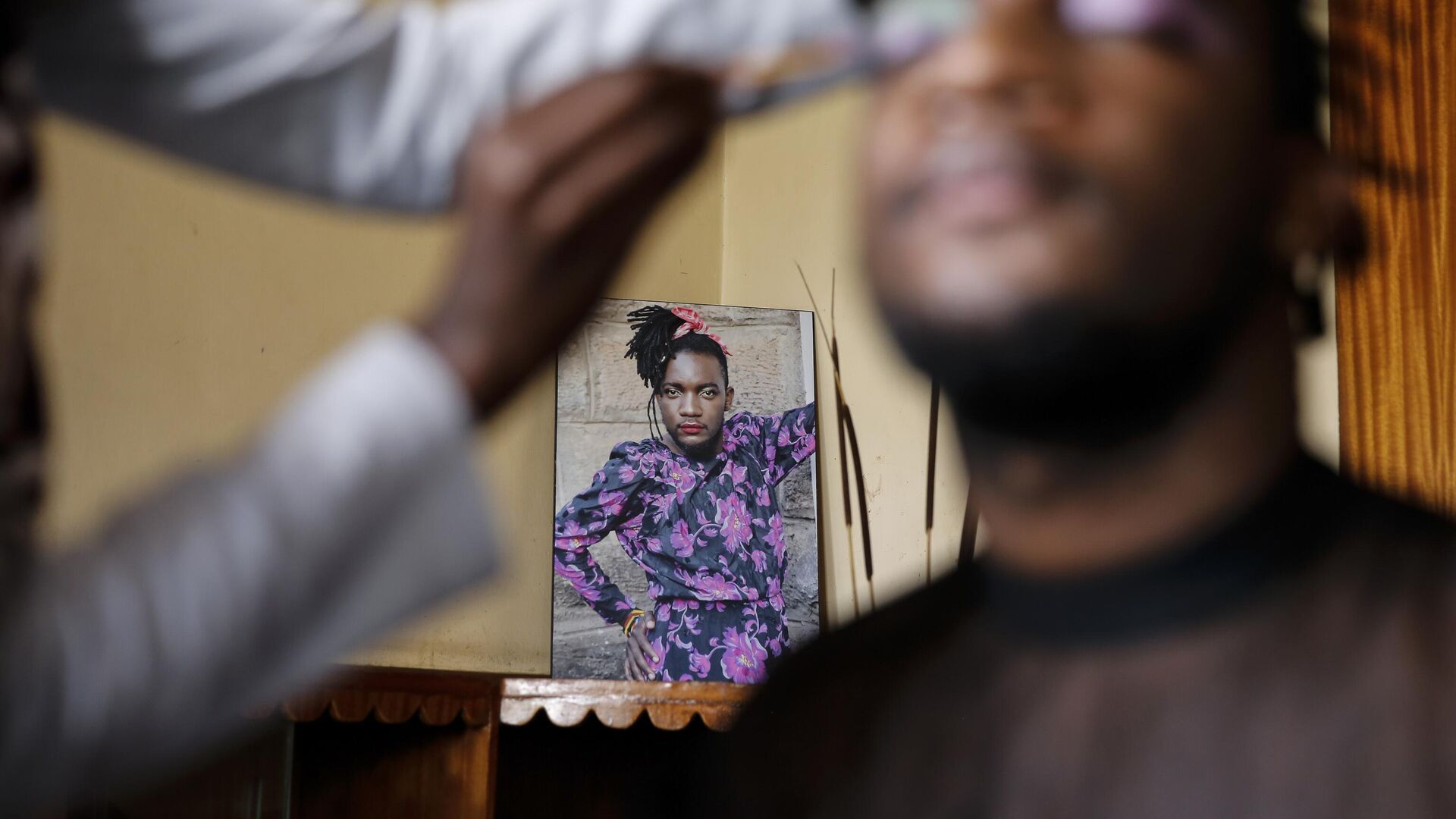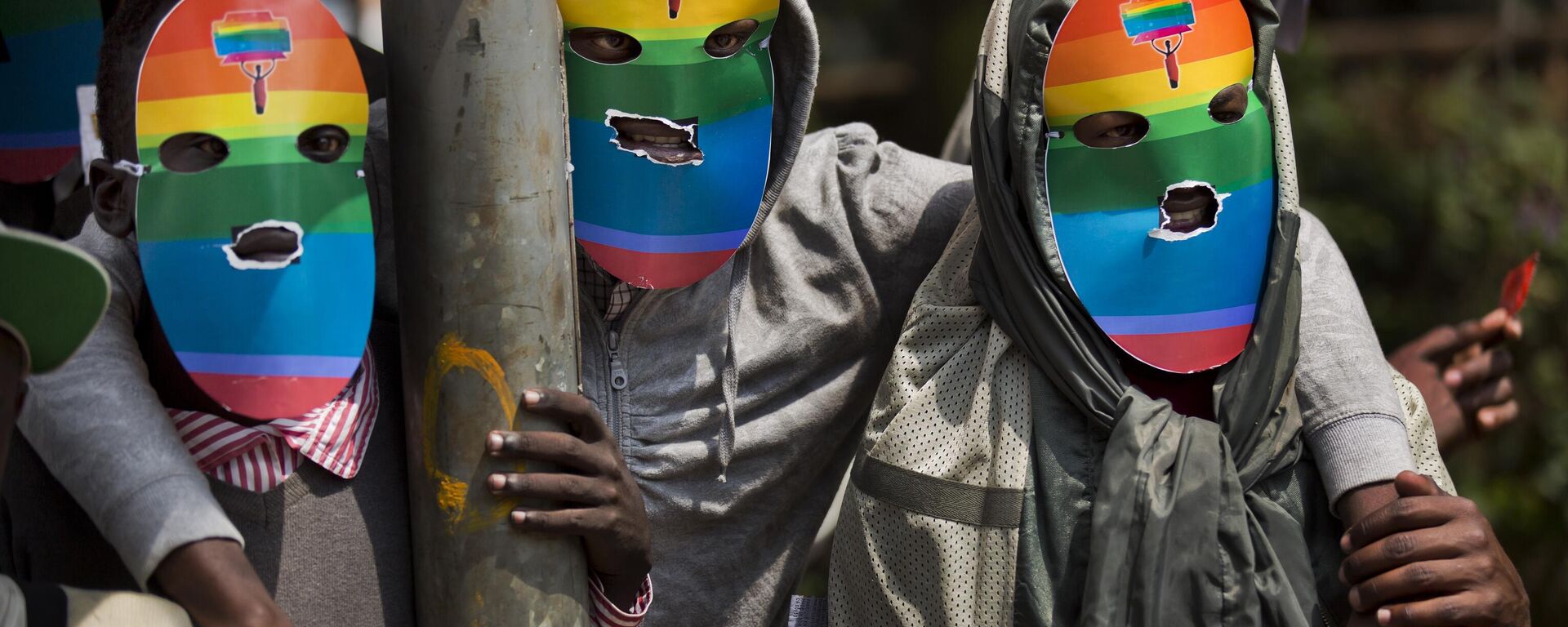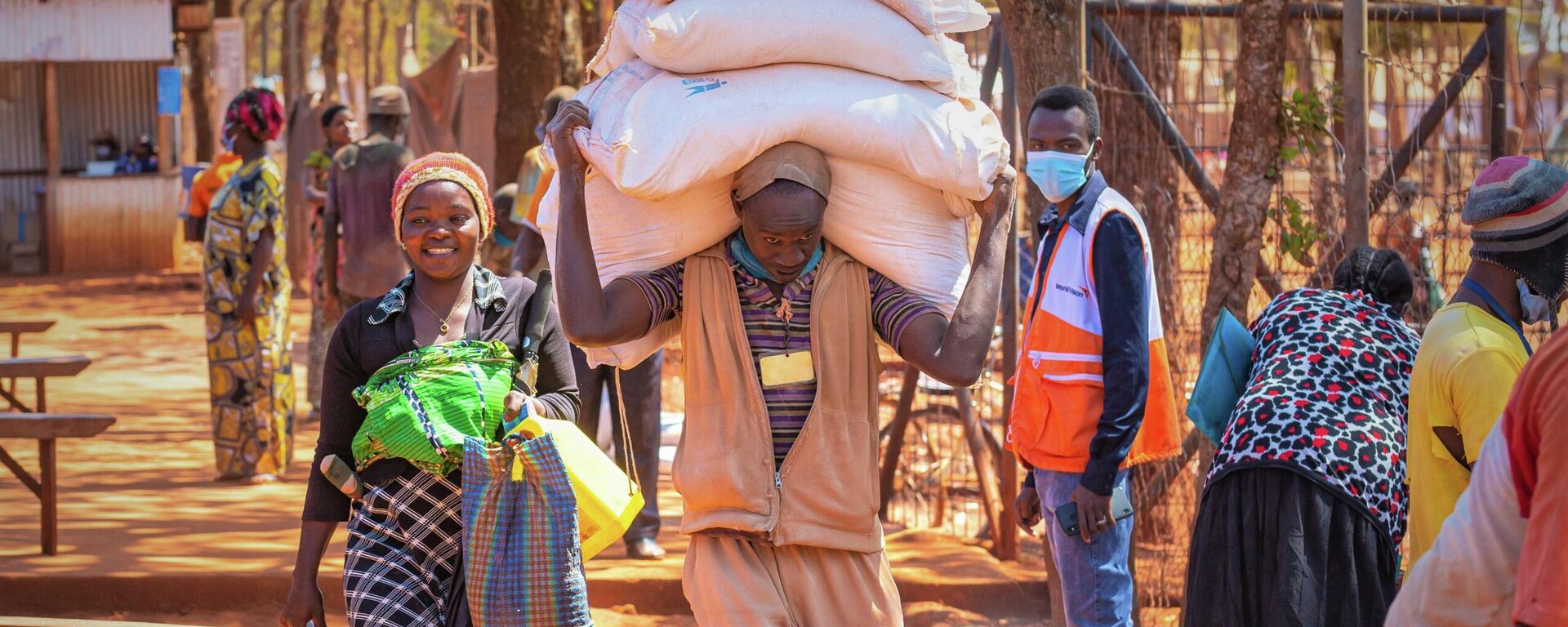https://en.sputniknews.africa/20231011/which-african-countries-have-faced-western-pressure-over-anti-lgbtq-legislation-1062686093.html
Which African Countries Have Faced Western Pressure Over Anti-LGBTQ Legislation?
Which African Countries Have Faced Western Pressure Over Anti-LGBTQ Legislation?
Sputnik Africa
A recent report by a Kenyan economist suggests that the passage of conservative legislation against LGBTQ activities in Kenya could have numerous implications... 11.10.2023, Sputnik Africa
2023-10-11T22:40+0200
2023-10-11T22:40+0200
2023-10-11T22:41+0200
sub-saharan africa
lgbt rights
anti-lgbt
anti-homosexuality
law
sanctions
us sanctions
west
https://cdn1.img.sputniknews.africa/img/07e7/0a/0a/1062687972_0:302:3072:2030_1920x0_80_0_0_11da86ac11f860d1697eef5bd491133c.jpg
A recent report warned about the potential backlash Nairobi could face from Western countries if the so-called Family Protection Bill, proposed by Homa Bay County MP Peter Kaluma, is passed into law after planned parliamentary debates.The economist said the East African country could lose about Sh4.186 trillion (about US$28 billion), including aid from Western donors such as the United States and the European Union, which is estimated at Sh446.7 billion (≈ US$3 billion) per year. This comes after case of neighboring Uganda drew widescale media attention, with the World Bank denying the country loans in the wake of the adoption of an anti-homosexuality law earlier this year.Sputnik Africa recalls what African countries are facing or had faced pressure from Western countries for passing anti-LGBTQ legislation.UgandaIn late May, Ugandan President Yoweri Museveni signed the Anti-Homosexuality Bill into law. This law criminalizes same-sex relations and imposes the death penalty in some cases, such as aggravated cases, with the aim of "protecting family values".The law was widely condemned by Western countries and LGBTQ rights groups, who called it one of the harshest anti-LGBTQ laws in the world.US President Joe Biden called the passage of the bill a "tragic violation of universal human rights" and urged Uganda to repeal the legislation immediately. He also threatened to cut US aid and investment in Uganda, which the authorities of the East African nation called "a blackmail."Moreover, Washington imposed travel restrictions on Ugandan officials, while the World Bank, following in the US' steps, suspended loans to Uganda in August on the grounds that the law "contradicts" its values. The financial institution's decision was condemned by Uganda's President Museveni, who called these actions an attempt to "coerce Uganda into abandoning its faith, culture, principles and sovereignty, using money."GhanaGhana's Parliament unanimously passed the "Promotion of Proper Human Sexual Rights and Ghanaian Family Values Bill" on July 5, 2023. The bill aims to proscribe lesbian, gay, bisexual, transgender, queer (LGBTQ+) and related activities.The US Ambassador to Ghana, Virginia Palmer, warned Ghanaians and lawmakers that the attempt to pass the anti-LGBT bill could affect the economy.According to Palmer, Ghanaians and lawmakers should be cautious about the move to pass the bill, arguing that it could be bad for the country's economy due to pressure from companies who might say they cannot set up their headquarters in Ghana because their employees would not be safe.NigeriaThe Same Sex Marriage Prohibition Act, which criminalizes same-sex relationships, was signed into law by Nigeria's then-President Goodluck Jonathan in January 2014. This law was met with condemnation from global human rights organizations and Western governments.Upon its passage in 2014, then-US Secretary of State John Kerry said the law was "inconsistent with Nigeria's international legal obligations and undermines the democratic reforms and human rights protections enshrined in its 1999 constitution."In a foreign policy memorandum signed by US President Joe Biden in February 2021 to promote the rights of LGBTQI+ people worldwide, Nigeria was listed among the countries that could face sanctions.Moreover, as the former Nigerian President Jonathan Goodluck, under whom the bill was passed, recalled, there was intense pressure from the UK to pass a law supporting same-sex marriage.Goodluck added that meetings critical of him were held at the White House.TanzaniaIn 2018, Paul Makonda, administrative chief of the Tanzanian Dar Es Salaam, announced that a special commission would identify and punish homosexuals, prostitutes and internet fraudsters in the city.In response, Washington accused the official of "gross violations of human rights" and two years later banned him and his family from entering the US. The European Union also recalled its ambassador from Tanzania and warned the authorities that it "will be conducting a broad review of its relations with Tanzania".In addition, the New York-based World Bank has withdrawn a $300 million loan to the East African country.
https://en.sputniknews.africa/20230921/you-cant-dictate-morals-kenyan-lawmaker-links-move-to-allow-lgbtq-groups-to-western-influence-1062260657.html
https://en.sputniknews.africa/20231011/how-could-wests-reaction-to-family-protection-bill-impact-kenya--what-is-culturally-free-aid-1062696758.html
west
Sputnik Africa
feedback@sputniknews.com
+74956456601
MIA „Rossiya Segodnya“
2023
Muhammad Nooh Osman
https://cdn1.img.sputniknews.africa/img/07e7/04/0a/1058467512_0:0:1280:1280_100x100_80_0_0_ec723833bcbfcaed2e21952965ad99e4.jpg
Muhammad Nooh Osman
https://cdn1.img.sputniknews.africa/img/07e7/04/0a/1058467512_0:0:1280:1280_100x100_80_0_0_ec723833bcbfcaed2e21952965ad99e4.jpg
News
en_EN
Sputnik Africa
feedback@sputniknews.com
+74956456601
MIA „Rossiya Segodnya“
Sputnik Africa
feedback@sputniknews.com
+74956456601
MIA „Rossiya Segodnya“
Muhammad Nooh Osman
https://cdn1.img.sputniknews.africa/img/07e7/04/0a/1058467512_0:0:1280:1280_100x100_80_0_0_ec723833bcbfcaed2e21952965ad99e4.jpg
lgbt rights, anti-lgbt, anti-homosexuality, law, sanctions, us sanctions, west
lgbt rights, anti-lgbt, anti-homosexuality, law, sanctions, us sanctions, west
Which African Countries Have Faced Western Pressure Over Anti-LGBTQ Legislation?
22:40 11.10.2023 (Updated: 22:41 11.10.2023) Muhammad Nooh Osman
Writer/Editor
A recent report by a Kenyan economist suggests that the passage of conservative legislation against LGBTQ activities in Kenya could have numerous implications for the East African country's economy, due to its reliance on politically conditioned Western aid.
A recent
report warned about the potential backlash Nairobi could face from Western countries if the so-called Family Protection Bill, proposed by Homa Bay County MP Peter Kaluma, is passed into law after planned parliamentary debates.
The economist said the East African country could lose about Sh4.186 trillion (about US$28 billion), including aid from Western donors such as the United States and the European Union, which is estimated at Sh446.7 billion (≈ US$3 billion) per year. This comes after case of neighboring Uganda drew widescale media attention, with the World Bank denying the country loans in the wake of the adoption of an anti-homosexuality law earlier this year.
Sputnik Africa recalls what African countries are facing or had faced pressure from Western countries for passing anti-LGBTQ legislation.
In late May, Ugandan President Yoweri
Museveni signed the Anti-Homosexuality Bill into law. This law criminalizes same-sex relations and imposes the death penalty in some cases, such as aggravated cases, with the aim of "protecting family values".
The law was widely condemned by Western countries and LGBTQ rights groups, who called it one of the harshest anti-LGBTQ laws in the world.
US President Joe Biden called the passage of the bill a "tragic violation of universal human rights" and urged Uganda to repeal the legislation immediately. He also threatened to cut US aid and investment in Uganda, which the authorities of the East African nation called "a blackmail."
Moreover, Washington
imposed travel restrictions on Ugandan officials, while the World Bank, following in the US' steps,
suspended loans to Uganda in August on the grounds that the law "
contradicts" its values.
The financial institution's
decision was condemned by Uganda's President Museveni, who called these actions an attempt to "
coerce Uganda into abandoning its faith, culture, principles and sovereignty, using money."
Ghana's Parliament
unanimously passed the "Promotion of Proper Human Sexual Rights and Ghanaian Family Values Bill" on July 5, 2023. The bill aims to proscribe lesbian, gay, bisexual, transgender, queer (LGBTQ+) and related activities.
The US Ambassador to Ghana, Virginia Palmer, warned Ghanaians and lawmakers that the attempt to pass the anti-LGBT bill could affect the economy.
According to Palmer, Ghanaians and lawmakers should be cautious about the move to pass the bill, arguing that it could be bad for the country's economy due to pressure from companies who might say they cannot set up their headquarters in Ghana because their employees would not be safe.
The Same Sex Marriage Prohibition Act, which criminalizes same-sex relationships, was signed into law by Nigeria's then-President Goodluck Jonathan in January 2014. This law was met with
condemnation from global human rights organizations and Western governments.
Upon its passage in 2014, then-US Secretary of State John Kerry said the law was "inconsistent with Nigeria's international legal obligations and undermines the democratic reforms and human rights protections enshrined in its 1999 constitution."
In a foreign policy memorandum signed by US President Joe Biden in February 2021 to promote the rights of LGBTQI+ people worldwide, Nigeria was listed among the countries that could face sanctions.
The memorandum directed the heads of US executive departments and agencies to impose a range of punitive diplomatic measures, including financial sanctions and visa restrictions, on countries that "abuse" the rights of LGBTQI+ people.
Moreover, as the former Nigerian President Jonathan Goodluck, under whom the bill was passed, recalled, there was intense pressure from the UK to pass a law supporting same-sex marriage.
"My government came under almost unbearable pressure from Mr. Cameron [David Cameron, the Prime Minister of the UK from 2010 to 2016], who reached me through envoys, and made subtle and not so subtle threats against me and my government," he said.
Goodluck added that meetings critical of him were held at the White House.
In 2018, Paul Makonda, administrative chief of the Tanzanian Dar Es Salaam, announced that a special commission would identify and punish homosexuals, prostitutes and internet fraudsters in the city.
In response, Washington accused the official of "gross violations of human rights" and two years later banned him and his family from entering the US.
The European Union also recalled its ambassador from
Tanzania and warned the authorities that it "will be conducting a broad review of its relations with Tanzania".
In addition, the New York-based World Bank has withdrawn a $300 million loan to the East African country.
Makonda said that he expected international criticism for the move, but added: "I prefer to anger those countries than to anger God."





